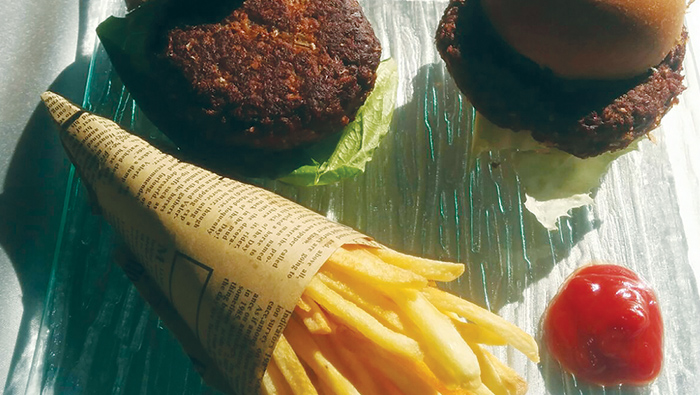The human race faces a serious conundrum. It is estimated that by 2040, we will need to feed more than 9 billion people and there is a growing concern about sustainability and availability of animal-based protein sources. While some companies are looking into edible insects like crickets, Yoram Yerushalmi and his partners at Israeli startup Flying Spark propose fruit fly larvae as a more nutritional, sustainable and affordable option to meat.
Yoram acknowledges that the “ew” factor may color the reaction of some to his proposal, but his arguments really make sense.
As a postdoctoral scholar at the University of Arizona, Yoram spent almost six years studying the metamorphosis of fruit flies – a natural continuation of his Ph.D. in insect physiology from the Hebrew University of Jerusalem. So when Israeli entrepreneur Eran Gronich approached him about launching a startup to produce insects for food, Yoram drew on his UA research to recommend the humble fruit fly as a superior form of protein.
“Crickets are hard to farm on a large scale,” says Yoram, CTO of Flying Spark. He states that when cricket farmers have tried to scale up their operations, the colony collapses and is unstable. “It’s like trying to farm rhinos and elephants. It’s really difficult.”
The Mediterranean fruit fly, on the other hand, is already being raised in factories for sterile insect technique (SIT) pest management, to reduce the use of chemical insecticides against medflies. In other words, the ability to mass produce hundreds of tons of non-GMO fruit flies has already been proven.
With a shorter lifecycle than other insects, it takes just one week from the time the female fruit fly lays an egg until the final larval stage, when Flying Spark harvests the larvae. Crickets take four to eight weeks to reach the same stage. This means less time is needed to carry out experiments – shortening the research and development cycle. Unlike crickets, flies have a pupal stage, which means that the larvae bear no resemblance to adult flies. “So I’m not talking about a buzzing fly. I’m talking about the larvae, which looks like a grain of rice. It is very small, no eyes, no antennas, no wings,” says Yoram, who now lives in Tivon, near Haifa.
He explains that the fruit fly eats only fruit, with no hormones, antibiotics or pesticides. They can actually be raised on fruit scraps, turning garbage into protein. Locusts and hoppers, on the other hand, eat grass. “So instead of growing grass for cows, you grow grass for locusts or hoppers, that does very little to change the ecological footprint,” says Yoram. The flies are raised on trays, which are stackable. “We can minimize the amount of land we are using for farming. So, sustainability wise, flies are better than any other insect. The crickets, hoppers and moths all need a lot of space – not compared to cows, pigs or chickens, of course, but compared to flies. You cannot stack them, because it makes it hard to tend to them when you farm them.”
Another plus – fruit flies are self-cleaning. “They purge the gut just before they pupate, so everything that is in there, which, to begin with, is just fruit, is purged out of the gut,” he says. The larvae then crawl out of the fruit where they were living for the last week, and fall off the trays into a tank of water.
After the larvae are extracted from the water they are boiled and ready for processing. They can be used as a meat substitute in hamburgers or chicken nuggets, pressed to extract a milk-like fluid (which Yoram says is similar to almond milk), processed into protein powder or dried for use in cooking.
So far, Flying Spark has used fly powder to make pasta, pastries, cookies, bread and crackers. The larvae have also been processed into a substance that has a consistency somewhere between cheese and tofu. “The animal itself seems to be very flexible,” Yoram says. They are now looking into uses for the oil that is separated out to make low-fat protein powder. Fun fact: fruit fly larvae have about 10% fat; which is relatively easy to extract because it’s not integrated into the muscle, as it is in vertebrates.
In informal taste tests at showcases and conferences, the reactions have been positive. “People usually like the idea and the flavor. It’s a unique flavor. It has some sharpness to it. It’s very unique and distinguished. But it’s not too pronounced,” says Yoram. He noted that people on the both the west and east coast, especially those in their 20s and 30s, are the most interested in insects as alternative meat products. The sustainability and minimal ecological footprint of the fruit fly are big selling points.
Flying Spark has already started drawing international attention. Last year, Yoram and Eran spent four months at the prestigious MassChallenge Boston Accelerator for startups. Flying Spark was one of just 200 companies selected out of the 2,300 that applied for the program. Two of the mentors they worked with decided to invest in the company. When they returned to Israel, they formed partnerships with BioBee, the only company in the Middle East that farms Mediterranean fruit flies, and Strauss, one of the three major food companies in Israel. They received funding to join Israel’s first food-tech incubator, the Kitchen Hub, for two years. Ironically, Israel is not their target market, because fruit flies are not kosher. But, Yoram says, “The fact that Strauss, which is actually a very conservative food company in Israel, has joined us and supports the startup, gives future investors some kind of comfort zone.”
One of the challenges Flying Spark faces is the issue of regulation. Yoram says they are working with both the Federal Drug Administration in the United States and the European Food Safety Authority to clarify how they will regulate insects for human consumption. “The subject is not clear yet,” says Yoram.
If they can overcome this hurdle, and a few others (including the “ew” factor), Flying Spark and the lowly Mediterranean fruit fly may just hold the key to a sustainable, nutrient-packed source of protein that could help solve the food security issues facing our planet in the decades to come.
For more information, visit theflyingspark.com.






